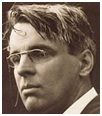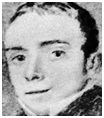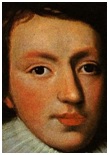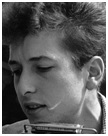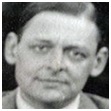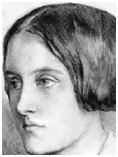|
 |
|
 |
Poetry - Objectives and Purpose
Langston Hughes (1902-67), Dreams The American poet (pictured right) says that dreams are vital to success:
Hold fast to dreams For if dreams die Life is a broken-winged bird That cannot fly. (first verse)
W. B. Yeats (1856-1939) He wishes for the
Cloths of Heaven The Irish poet (pictured right) also describes the importance of dreams, however poor and lowly you are:
Had I the heavens' embroidered cloths, Enwrought with golden and silver light, The blue and the dim and the dark cloths Of night and light and the half-light, I would spread the cloths under your feet: But I, being poor, have only my dreams; I have spread my dreams under your feet; Tread softly because you tread upon my dreams. (the complete poem).
Thomas Lovell Beddoes (1803-49), Dream-Pedlary
The English poet (pictured right) asks : which dreams would you buy?
If there were dreams to sell, Merry and sad to tell, And the crier rang the bell, What would you buy? (last four lines of first verse)
Arnold Silcock (1883-1959),The Optimist and the Pessimist The English poet (pictured right) says be optimistic.
The optimist who always was a fool, Cries ‘Look! My mug of ale is still half full’ His brother gives the facts that proper twist - ‘My mug’s half empty!’, sighs the pessimist.
Frederick Langbridge (1849-1923), Philosophy The English poet says you can be negative or positive about life.
Two men look through the same bars: One sees mud – and one sees stars.
William Blake (1757-1827), Great
Things Are Done The English poet (pictured right) says challenge yourself to achieve great things:
Great things are done when men and mountains meet; This is not done by jostling in the street.
William Blake, And Did Those Feet In Ancient Time (1808) This poem was used in the hymn, Jerusalem. It ends with the stirring verse:
I will not cease from mental fight, Nor shall my sword sleep in my hand: Till we have built Jerusalem, In England's green and pleasant land.
John Milton (1608-74), Paradise Lost
(1667) The English poet (pictured right) shows that life has endless possibilities by describing the story of Adam and Eve:
Some natural tears they dropped, but wiped them soon; The world was all before them, where to choose Their place of rest, and Providence their guide; They, hand in hand, with wandering steps and slow Through Eden took their solitary way.
They are sad because of their banishment from the Garden of Eden by God for eating the forbidden fruit. But they wipe away their tears and get on with their lives.
Bob Dylan, It's Alright, Ma (I'm Only Bleeding),
1965 Dylan's (pictured right in 1963) song says how the rat race can destroy people's moral purpose:
While one who sings with his tongue on fire Gargles in the rat race choir Bent out of shape from society's pliers Cares not to come up any higher But rather get you down in the hole That he's in. (verse 15)
T.S. Eliot (1888-1965), East Coker (1940) The American-born British poet (pictured right) says simply: In my beginning is my end.
Christina Rossetti, A Wish (1862) The English poet (pictured right) describes her wishes: I wish I were a little bird That out of sight doth soar; I wish I were a song once heard But often pondered o'er, Or shadow of a lily stirred By wind upon the floor, Or echo of a loving word Worth all that went before, Or memory of a hope deferred That springs again no more.
|
|
|
||
|
|
|
||
|
||
| Copyright © wisdomtowin.com All Rights Reserved | ||
|


